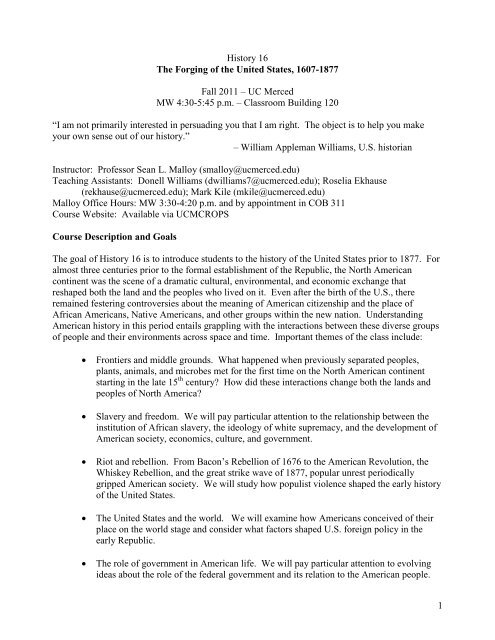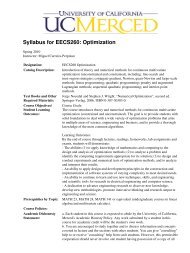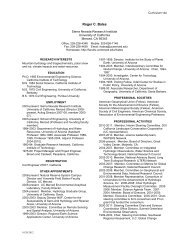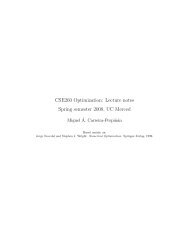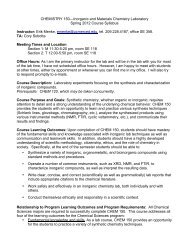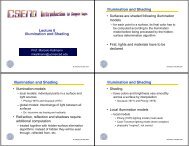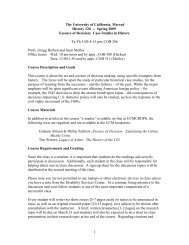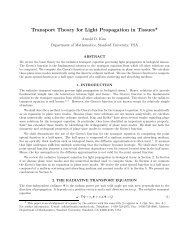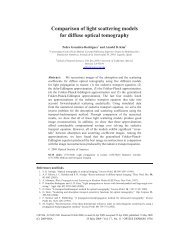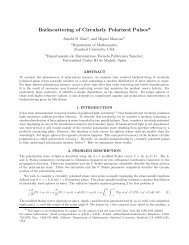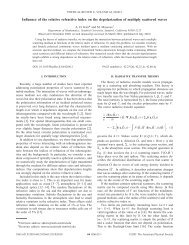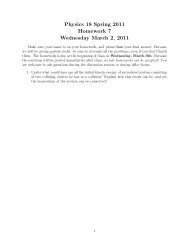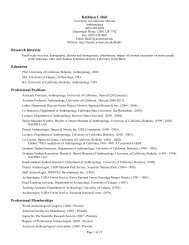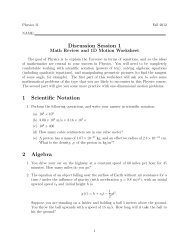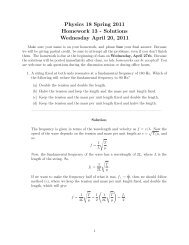You also want an ePaper? Increase the reach of your titles
YUMPU automatically turns print PDFs into web optimized ePapers that Google loves.
History 16<br />
The Forging of the United States, 1607-1877<br />
Fall 2011 – UC Merced<br />
MW 4:30-5:45 p.m. – Classroom Building 120<br />
“I am not primarily interested in persuading you that I am right. The object is to help you make<br />
your own sense out of our history.”<br />
– William Appleman Williams, U.S. historian<br />
Instructor: Professor Sean L. Malloy (smalloy@ucmerced.edu)<br />
Teaching Assistants: Donell Williams (dwilliams7@ucmerced.edu); Roselia Ekhause<br />
(rekhause@ucmerced.edu); Mark Kile (mkile@ucmerced.edu)<br />
Malloy Office Hours: MW 3:30-4:20 p.m. and by appointment in COB 311<br />
Course Website: Available via UCMCROPS<br />
Course Description and Goals<br />
The goal of History 16 is to introduce students to the history of the United States prior to 1877. For<br />
almost three centuries prior to the formal establishment of the Republic, the North American<br />
continent was the scene of a dramatic cultural, environmental, and economic exchange that<br />
reshaped both the land and the peoples who lived on it. Even after the birth of the U.S., there<br />
remained festering controversies about the meaning of American citizenship and the place of<br />
African Americans, Native Americans, and other groups within the new nation. Understanding<br />
American history in this period entails grappling with the interactions between these diverse groups<br />
of people and their environments across space and time. Important themes of the class include:<br />
Frontiers and middle grounds. What happened when previously separated peoples,<br />
plants, animals, and microbes met for the first time on the North American continent<br />
starting in the late 15 th century? How did these interactions change both the lands and<br />
peoples of North America?<br />
Slavery and freedom. We will pay particular attention to the relationship between the<br />
institution of African slavery, the ideology of white supremacy, and the development of<br />
American society, economics, culture, and government.<br />
Riot and rebellion. From Bacon’s Rebellion of 1676 to the American Revolution, the<br />
Whiskey Rebellion, and the great strike wave of 1877, popular unrest periodically<br />
gripped American society. We will study how populist violence shaped the early history<br />
of the United States.<br />
The United States and the world. We will examine how Americans conceived of their<br />
place on the world stage and consider what factors shaped U.S. foreign policy in the<br />
early Republic.<br />
The role of government in American life. We will pay particular attention to evolving<br />
ideas about the role of the federal government and its relation to the American people.<br />
1
In addition to learning about specific historical events and themes, this course is also designed to<br />
introduce students to the study of history as a discipline and a way of thinking. You will work with<br />
primary source documents that provide firsthand accounts of the people and events that we are<br />
studying. You will also read, discuss, and write about works produced by professional historians.<br />
By the end of this course, you will have learned not only about the early history of the United<br />
States, but also about how to construct and analyze an historical argument.<br />
Course Materials<br />
Please complete all assigned readings before your assigned discussion section meeting for that<br />
week.<br />
Required books:<br />
Cabeza de Vaca, Cabeza De Vaca's Adventures in the Unknown Interior of America<br />
William Cronon, Changes in the Land: Indians, Colonists and the Ecology of New England<br />
Harriet Jacobs, Incidents in the Life of a Slave Girl<br />
Paul E. Johnson and Sean Wilentz, The Kingdom of Matthias: A Story of Sex and Salvation<br />
in 19th Century America<br />
Rebecca Harding Davis, Life in the Iron Mills<br />
James M. McPherson, For Cause and Comrades: Why Men Fought in the Civil War<br />
Online reader: Some readings have been placed online and are available at our UCMCROPS<br />
website. Readings designated by a number (e.g. Reading 2.1: Excerpts from Alexander<br />
Exquemelin, The Buccaneers of America, 1678) indicate materials available on UCMCROPS in the<br />
“Resources” folder grouped by the date of the discussion section meeting.<br />
Course Requirements and Grading<br />
Grading breakdown:<br />
Short paper (2-4 pages) 10% Due in class Monday, September 19<br />
Midterm exam 25% In class Monday, October 17<br />
Paper (5-7 pages) 25% Due in class Monday, November 14<br />
Cumulative final exam 30% In class Friday, December 16, 3:00-6:00 p.m.<br />
Section grade 10% To be formulated by your TA<br />
Written assignments turned in up to 24 hours late will receive a 1/3 grade reduction (e.g. an A<br />
would become an A-). Work turned in between 24-72 hours late will be lowered a full grade except<br />
in documented cases of serious illness or emergency. Any work turned in after 72 hours late will<br />
not be accepted and will count as an F. Exams must be taken at the scheduled times.<br />
2
Accommodations for Students with Disabilities<br />
The University of California is committed to ensuring equal academic opportunities and inclusion<br />
for students with disabilities based on the principles of independent living, accessible universal<br />
design, and diversity. Any student who feels he or she may need an accommodation based on the<br />
impact of a disability should contact the instructor and their TA privately to discuss his or her<br />
specific needs. Also contact Disability Services at (209) 228-7884 as soon as possible to become<br />
registered and thereby ensure that such accommodations are implemented in a timely fashion.<br />
Writing Tutors<br />
Students who would like help with their writing are encouraged to visit the Student Advising and<br />
Learning Center (SALC) in Kolligian 172. Please check their website (learning.ucmerced.edu) for<br />
details on tutoring and other academic assistance.<br />
Academic Honesty<br />
Students and professors are governed by the Academic Honesty Policy, which is available at the<br />
Students First Center at Kolligian Library and at http://studentlife.ucmerced.edu. Cheating and<br />
plagiarism are serious offenses which may be grounds for suspension or dismissal from the<br />
university. Basic guidelines to avoid these problems are outlined below, but if you are in any doubt,<br />
please consult the instructor or your Teaching Assistant.<br />
The in-class midterm and final exam are closed book. No notes, papers, or books should be open<br />
and all electronic devices should be turned off and placed under your chair. Study guides will be<br />
distributed before the in-class midterm and final exams. Questions on the midterm and final will be<br />
drawn directly from those on the guide (though not all questions on the guide will appear on the<br />
exam). You should not prepare collaborative answers or outlines for the questions on the study<br />
guide. If you have questions about the study guide, please consult the instructor or your Teaching<br />
Assistant.<br />
Plagiarism in written work (such as the two assigned papers) is not always easy to define. As a<br />
simple guideline, if you submit your own work, you will avoid all serious types of plagiarism. If<br />
you use a direct quotation or borrow an interpretive idea from another work, you must cite it. If you<br />
paraphrase another document, you must cite it. The basic standard: If you use any idea that did not<br />
originate in our own mind, you must cite it.<br />
3
Course Schedule and Reading Assignments<br />
Note: the reading listed under each week below should be completed by the time of your discussion<br />
section meeting for that week. For books, unless page numbers are specified in the assignment, you<br />
should read the entire book. Please bring relevant books and a printed copy of any online materials<br />
to your discussion section each week. You do not need to bring these materials to lecture.<br />
August 29: Myths and Mound Builders<br />
August 31: Europe and America, 1491<br />
Section Reading:<br />
Week 1: Old Worlds<br />
Start reading Cabeza de Vaca, Adventures. Discussion sections will meet this week<br />
primarily for the purpose of helping you get to know your TA and your fellow students.<br />
September 5: Labor Day; No Class<br />
Week 2: New Worlds for All<br />
September 7: The Columbian Exchange and the Spanish Empire<br />
Section Reading:<br />
No sections this week (Labor Day). On your own, finish Cabeza de Vaca, Adventures and<br />
start reading Cronon, Changes in the Land, pages 3-158.<br />
September 12: The Scramble for America<br />
Week 3: Empires in the Americas<br />
September 14: Puritans, Pilgrims, and Planters: British North America<br />
Section Reading:<br />
Discussion of Cabeza de Vaca, Adventures and Cronon, Changes in the Land, pages 3-158.<br />
4
September 19: Slavery and the Atlantic World<br />
Week 4: Towards a Slave Society<br />
NOTE: Short paper (2-4 pages) due in class today.<br />
September 21: The Slave Experience: Diversity, Brutality, Survival, and Resistance<br />
Section Reading:<br />
Reading 1.1: The Diary of William Byrd II of Westover, Virginia, 1709-1712.<br />
Reading 1.2: Kathleen M. Brown, Good Wives, Nasty Wenches, and Anxious Patriarchs:<br />
Gender, Race, and Power in Colonial Virginia, 328-335, 350-361.<br />
September 26: Piratical Imperialism<br />
Week 5: Pirate Skulls and Bones<br />
September 28: Pirates in the Age of Mercantile Capitalism<br />
Section Reading:<br />
Reading 2.1: Excerpts from Alexander Exquemelin, The Buccaneers of America (1678)<br />
Reading 2.2: Excerpts from Daniel Defoe, A General History of the Pyrates (1724)<br />
Week 6: The American Insurgency<br />
October 3: Origins of the Anglo-American Rift<br />
October 5: The American Revolution(s)<br />
Section Reading:<br />
Reading 3.1: Declarations of the Stamp Act Congress, 1765.<br />
Reading 3.2: The Declaration of Independence, 1776.<br />
Reading 3.3: Thomas Paine, Common Sense, 1776.<br />
Reading 3.4: Abigail Adams on Women’s Rights, 1776.<br />
Reading 3.5: Massachusetts Slave Petition, 1777.<br />
5
October 10: Roads to Philadelphia<br />
Week 7: Making A New Nation<br />
October 12: Setting the Boundaries of the New Republic<br />
Section Reading:<br />
Reading 4.1: James Madison, “Deficiencies of the Confederation,” 1787.<br />
Reading 4.2: The Constitution of the United States, 1787.<br />
Reading 4.3: Patrick Henry, “Virginia Should Reject the Constitution,” 1788.<br />
Reading 4.4: The Bill of Rights, 1789.<br />
October 17: MIDTERM EXAM<br />
Week 8: The Early Republic<br />
October 19: Scoundrels, Bastards, Puppies, and Murderers: Politics in the Early Republic<br />
Section Reading: No reading, no sections this week. Study for your midterm exam.<br />
Week 9: The Age of Jackson<br />
October 24: The Market Revolution and the Democratic Revolution<br />
October 26: Andrew Jackson: Good, Evil, and the Presidency (film)<br />
Section Reading:<br />
Wilentz and Johnson, Kingdom of Matthias.<br />
Week 10: Living and Working in the Industrial North<br />
October 31: The Making of the American Working Class<br />
November 2: I Wanna Riot: A Night at the Astor Place<br />
Section Reading:<br />
Davis, Life in the Iron Mills, pages 9-66.<br />
6
November 7: Slavery and King Cotton<br />
Week 11: The Antebellum South<br />
November 9: Unchained Memories: Readings From the Slave Narratives (film)<br />
Section Reading:<br />
Jacobs, Incidents in the Life of a Slave Girl.<br />
Week 12: Manifest Destiny and Westward Expansion<br />
November 14: Antebellum Foreign Policy<br />
NOTE: Paper (5-7 pages) is due in class today.<br />
November 16: Manifest Destiny and the War with Mexico<br />
Section Reading:<br />
Reading 5.1: The Monroe Doctrine, 1834.<br />
Reading 5.2: William Appleman Williams, “Manifesto of the U.S. Empire.”<br />
Reading 5.3: Andrew Jackson on Indian Removal, 1830.<br />
Reading 5.4: Thea Perdue, “The Origins of Removal.”<br />
Reading 5.5: John L. O’Sullivan on Manifest Destiny, 1839.<br />
Reading 5.6: Reginald Horseman, “Anglo-Saxon Racism.”<br />
November 21: The Cause – 1861 (film)<br />
Week 13: The Civil War<br />
November 23: No Class; Time for Individual Meetings<br />
Section Reading: Thanksgiving holiday; no section meetings.<br />
Week 14: The Civil War (continued)<br />
November 28: Origins and Conduct of the Civil War<br />
November 30: Emancipation and Reconstruction<br />
Section Reading:<br />
McPherson, For Cause and Comrade.<br />
7
Week 15: The Failed Promise of Reconstruction<br />
December 5: The End of Reconstruction and the Triumph of White Supremacy<br />
December 7: Summary Lecture In Which I Explain Absolutely Everything; Evaluations<br />
Section Reading:<br />
Reading 6.1: Martin Delany, “Advice to Former Slaves,” 1865.<br />
Reading 6.2: Frederick Douglass, “What the Black Man Wants,” 1865.<br />
Reading 6.3: Atlanta News, “White People Must Regain Control of the Their<br />
States,” 1870.<br />
Reading 6.4: “Organization and Principles of the Ku Klux Klan,” 1868.<br />
8


